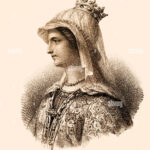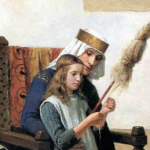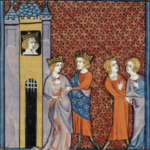
Date of Birth
0537
Place of Birth
Paris, Seine, Île-de-France, France
Towns / Cities Moved Into
Paris, Seine, Île-de-France, France |
Rheims, Marne, Loire-Atlantique, France
Known Occupation
Christian
Religion
-
Spouse
Death Information
Year of death
601
Place of death
Canterbury, City of Canterbury, Kent, England
Cause of death
-
Burial location
St Martin Churchyard Canterbury, City of Canterbury, Kent, England
Obituary

Parents

King Charibert I Of Paris

Queen Ingoberge De París
Marital Status


Married Ausbert the Senator
Children





Narrative / Story
Berthe Kent, known in history as Blithildis de Cologne, was born in the year 0537 in the vibrant city of Paris, Seine, Île-de-France, France. As a daughter of King Clotaire I of the Salian Franks and Lady Radegonde of the Thuringian Franks, she was born into the illustrious Merovingian dynasty, a lineage that played a pivotal role in shaping the early medieval European landscape. Her birth came at a time when the Frankish kingdom was rising as a dominant force in the remnants of the Roman province of Gaul, a period marked by significant socio-political changes following Clovis I’s conversion to Orthodox Christianity.
Growing up in the royal court of Paris, Berthe’s early life was likely characterized by the opulence and complexity of Merovingian politics. The era was one of transition, with the fading influence of Roman culture giving way to the burgeoning Frankish rule. This environment would have profoundly influenced her upbringing, instilling in her the nuances of governance, diplomacy, and the responsibilities that came with her royal status. As a princess, she would have been at the center of the cultural and religious shifts of her time, witnessing firsthand the transformation of her society.
In 0530, Berthe’s life took a significant turn when she married Ausbert the Senator, also known as Ansbert Sénateur de Moselle et de Schelde. This marriage was not merely a personal union but a strategic alliance that served to strengthen the ties between powerful Frankish families. Ausbert was a man of considerable influence, and their marriage symbolized the intricate web of political relationships that defined the era. Through this union, Berthe transitioned from a princess to a queen, taking on new roles and responsibilities.
Together, Berthe and Ausbert had a large family, including notable children such as King Arnoldus Of Saxony and several others who rose to prominence in religious and political spheres. Her life as a queen and mother would have been busy, filled with the duties of managing a royal household and nurturing her children in an environment that demanded both political acumen and personal fortitude. Her role likely extended beyond the domestic sphere, involving her in the social and religious activities befitting her status.
Despite the lack of specific records detailing Berthe’s personal experiences with socio-economic issues or discrimination, it is plausible to assume that her life was deeply influenced by the broader socio-political dynamics of her time. The Merovingian period was characterized by internal power struggles and external conflicts, and as a woman of high status, Berthe would have been directly affected by these events. Her position would have required her to navigate the complexities of her era, balancing the demands of her family with the ever-changing political landscape.
Berthe’s work life, though not documented in traditional terms, would have involved significant engagement in the affairs of her household and possibly in the political undertakings of her husband’s senatorial role. The period was marked by migrations and territorial expansions, which would have had a direct impact on her life and the decisions she had to make. As a queen, she would have had to adapt to new political realities, forge alliances, and maintain the stability of her family amidst the tumultuous backdrop of her time.
Berthe’s life came to an end in the year 0580 at the age of 43 in Canterbury, Kent, England, United Kingdom. Her death marked the conclusion of a life that was deeply entwined with the significant historical events of the early medieval period. She was laid to rest in Canterbury St Martin, a burial that reflected her esteemed position and the respect she garnered throughout her life.
The era in which Berthe lived was one of great historical importance. The early 6th century was a time of consolidation and expansion for the Frankish kingdom, with Clovis I and his descendants, including Berthe’s father Clotaire I, laying the groundwork for what would eventually become the Frankish Empire. This period saw the transformation of Western Europe, with the Frankish kingdom emerging as a major force, influencing the cultural, political, and religious landscape of the region.
In retrospect, Berthe Kent’s life story is a reflection of the intricate interplay between personal and political dynamics in an era that was instrumental in shaping the course of European history. Her narrative, woven through the rich tapestry of early medieval Europe, offers a glimpse into the life of a woman who lived at the crossroads of significant historical transformations. Her legacy, though not extensively documented, remains an integral part of the rich heritage of the Merovingian dynasty and the early medieval period.




